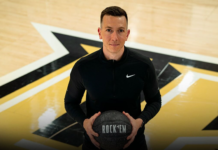The University of Central Florida club ‘Gaming Knights’ organizes and hosts several video game tournaments throughout the year. They frequently fill ballrooms, game stores, and student houses with anticipation, egos and yards and yards of tangled electric cords.
On those days Alex Chiricosta, a senior radio television major and Gaming Knights president, can be seen buzzing through crowds of eager gamers welcoming friends and trying to maintain some level of order. All the while, his staff will be shouting out names like “Hungrybox”, “Zorro” and “AceDudeYeah,” the gaming tags of the tournament players next in line.
Amidst all the commotion of smack talk, high fives, upsets and triumphs found at these tournaments, there will be, most importantly, friends doing what they love to do together.
“That was one thing I wanted to aim for the most,” said Chiricosta, in describing his reasons for initiating the club. “It’s more of a social community.”
There are many opportunities for video game players at UCF, not only socially through events put on by Gaming Knights, but financially as well. The lessons that hard work and practice are universally beneficial, that following your passion can pay of, that banding together can have a positive influence on your community, are all apparent in the UCF gaming community.
Even though the tournaments are competitive, the UCF gaming community and Gaming Knights is one of respect for its members, Chiricosta said. With many outside events such as bowling nights and gaming events at club members’ houses, Gaming Knights is definitely a friendship building endeavor.
While some new members may be apprehensive about meeting people, Chiricosta said, the club events are set up to create interactions among its members.
“We’ll have six or seven TV’s set up and different tournaments will be going on, but there will be 90 kids there, and it’s like when they’re not playing they’re kind of forced to be sociable,” Chiricosta said. “After the first few they start making more friends.”
Chiricosta’s viewpoint is backed by other members of Gaming Knights.
“I’ve made a lot of friends through the club,” said Mazin Musallam, an information technology sophomore and fighting games director. ”If you’re going to join the club and come to our events, you’re going to end up playing with other people, and meeting other people and eventually hanging out with them outside the club.”
Some competitive players actually get cash and prizes from their tournament winnings. Some have even managed to develop careers from their gaming experience at UCF. Chiricosta said that a recent member of LAN Knights (a precursor to Gaming Knights), Justin “Whiplash” Wilson, was offered a job commentating spectator videos games in South Korea after his work was noticed at a UCF sponsored gaming event.
UCF computer science major Colin Green is one of Florida’s top ranked competitive players for “Super Smash Brothers Melee,” a wildly popular fighting game. His biggest prize winnings at one local tournament were substantial considering he was doing something that he loved to do.
Green said he once took home around $400 for winning first place at a large central Florida tournament. He pointed out the potential earnings at video game tournaments on a national level.
“Depending on the sponsorship, or lack thereof, and the scale of the tournament, first place can be thousands of dollars,” Green said.
The gaming community, not only at UCF, has a way of pulling together for a united purpose. An Orlando native and the second best in the nation for Super Smash Brothers Melee, Juan Debiedma, recounted what it took for his gaming community to get their game into the biggest fighting game tournament in the world, Evo.
To fill an open spot at their tournament in Las Vegas, Evo decided to hold a contest to see which group could raise the most money for the fight against breast cancer. The group that raised the most would put their game in the competition.
“It was a huge thing this year because Smash Brothers ended up winning that drive, raising like $30,000 at the last minute,” Debiedma said. “We actually ended up raising $94,000 with the final standing.”
This video game, along with many others, was not intended to create such a following on the competitive scene. Furthermore, to many UCF students video games are just another excuse to get together and have a fun time.
“The point of videos games, to me, is to have a good time,” said Jacqueline Gibson, a senior environmental studies major. “No matter what you’re playing.”
It is hard to imagine that this practice, which is often stereotyped as time wasting and solitary, can bring about the opportunities and friendships that some UCF gamers have experienced. The irony in fighting games standing out as something that brings people together is thick. Beside the devout passion some gamers have for their craft, there is another common thread that links them to one another; respect.
At a recent tournament in the Pegasus Ballroom that notion was apparent. Even though many gamers came, at different skill levels, to participate in different events, they could all relate to each other. There was almost a sense of brotherhood there.
“Everybody just respects each other for their game, whether you’re good or bad,” Chiricosta said.






